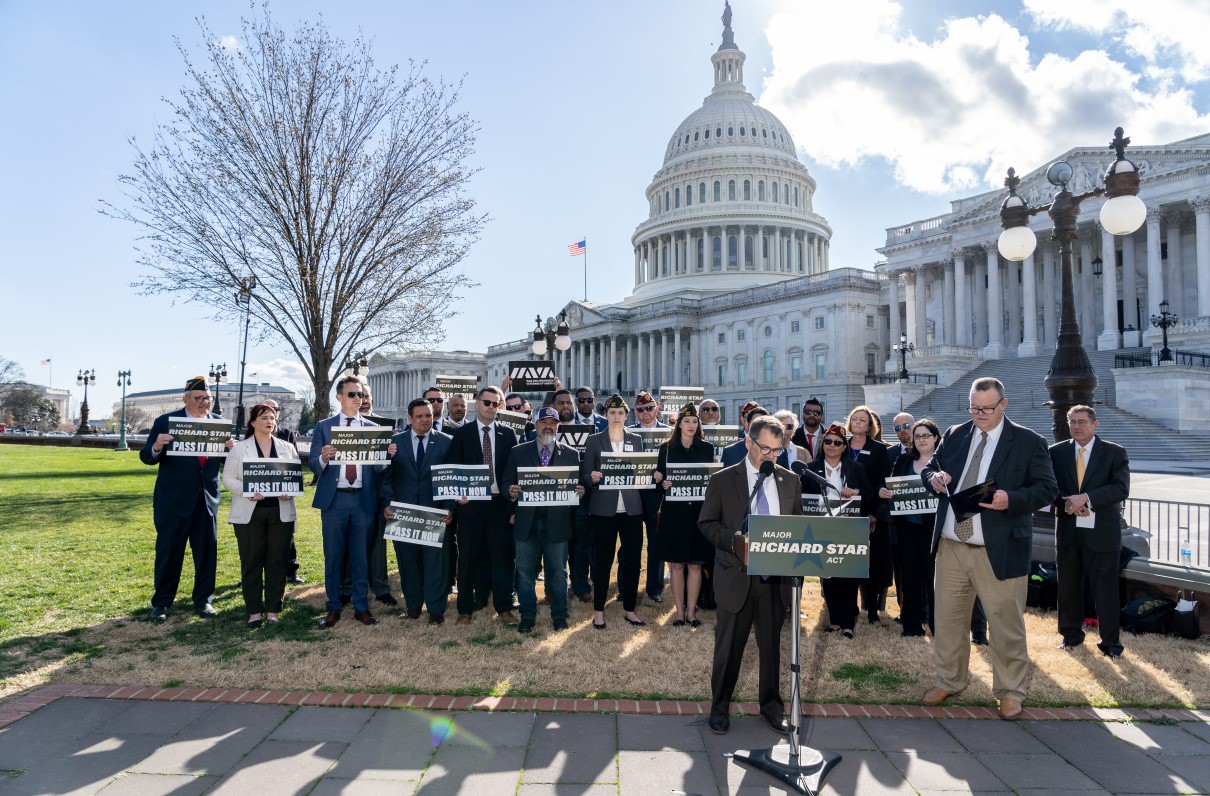Neither the House nor the Senate version of the FY 2024 National Defense Authorization Act (NDAA) includes language from the Major Richard Star Act, a bipartisan bill supported by nearly 400 lawmakers to support combat-injured veterans.
The exclusion, based on cost concerns, has left many across our community disappointed and angry, and sends an awful message to combat-injured veterans who earned their medical retirement pay through extraordinary sacrifice, only to have it reduced to help the bottom line.
More than two-thirds of Congress supports the Major Richard Star Act (H.R. 1282/S. 344), with 327 of 435 House members and 71 of 100 senators signed on as co-sponsors as of Aug. 14. The legislation reverses an unjust offset, which requires these retirees to give up a dollar of DoD-earned retirement pay for every dollar of VA-provided disability benefits they receive.
[TAKE ACTION: Ask Your Legislators to Support Combat-Injured Veterans]
The bill cleared the House Armed Services Committee, so it technically can proceed to the House floor, but there is a big problem. First, lawmakers must figure out how to pay for the Star Act by making cuts somewhere else in government mandatory spending, in accordance with the so-called “CUTGO rule.” This will be a significant challenge as the 118th Congress faces a showdown on spending and possible government shutdown.
Isn’t There a Better Place to Save Money?
Yes. There are many ways Congress can achieve savings without putting the cost back on our uniformed community. Only elected officials and their staff have the full visibility of budget options available to Congress … and they also need the motivation to find a solution from constituents.
[FROM THE MILITARY COALITION: Star Act Information Paper]
It’s a frustrating situation. Military and veterans service organizations, as well as thousands of volunteers, rallied to secure support for the Star Act, and nearly 20,000 messages went out to lawmakers via MOAA’s Legislative Action Center on the topic during this legislative session alone.
Still, the bill did not receive a floor vote. This situation can lead to a lack of faith in the institution – the votes were there, but congressional leaders did not allow a vote due to the larger problem over how to address spending and the national debt.
What’s Next?
Continued pressure on your elected officials is necessary to get the Star Act across the finish line. The successful repeal of the “widows tax” – another unjust offset, this one preventing surviving spouses from receiving full Survivor Benefit Plan benefits and Dependency and Indemnity Compensation – required a decade of sustained advocacy pressure to achieve a legislative win.
The key lesson from that advocacy campaign is that sustained grassroots advocacy works. As we approach a budgetary showdown and a presidential election heats up, your voice as a constituent is critical.
There are 52,304 combat injured receiving Combat Related Special Compensation (CRSC) in lieu of retirement pay. It’s an awful financial outcome for those who volunteered to deploy to combat, often on more than one occasion.
The purpose of the offset is savings. In 2004, Congress acknowledged DoD retirement pay and VA disability pay were two different payments for two different purposes, but cost was a stumbling block. Congress granted concurrent receipt of retired pay and VA disability for those who served 20 or more years of service and had a 50% VA disability rating, with the intention to make incremental improvements in the financial out-years. Those improvements have yet to come.
Does Your Elected Official Support the Star Act?
Check these links to see whether your House member or senator has co-sponsored the Major Richard Star Act. If not, call MOAA’s toll-free Capitol switchboard – 866-272-MOAA (6622) – to connect with your legislators' offices.
Milestones and Moral Injury
This year marks the 50th anniversary of the all-volunteer force – an event that should be celebrated, not one marked by an ongoing recruiting crisis and the derailment of much-needed support for combat-injured veterans because of budget concerns. The two problems are linked; your lawmakers need to hear from you on the importance of supporting all who serve.
We mark another milestone in a few days – Aug. 26 is the two-year anniversary of the attack on Abbey Gate, where 13 servicemembers were killed and 45 were wounded during our disastrous withdrawal from Afghanistan.
Fighting in Afghanistan was always seasonal, and each year summer marked the height of fighting season. The withdrawal, during the height of fighting season, left many veterans with an increased sense of moral injury, questioning the value of their service and purpose. These veterans are less likely to recommend service to others, weakening an already-thin recruiting pool.
The approaching anniversary is an appropriate time to activate your network and ask your contacts to reach out to their House member and both senators. Ask them to support H.R. 1282/S. 344, by finding a budgetary solution and allowing a vote.
Click here to read more about MOAA’s advocacy efforts on the issue and get talking points to share with your legislators and their staffers. For more information on other advocacy initiatives, please visit MOAA’s Advocacy News page.
[FROM 2022: Star Act Not Included in NDAA Despite Strong and Growing Support]



